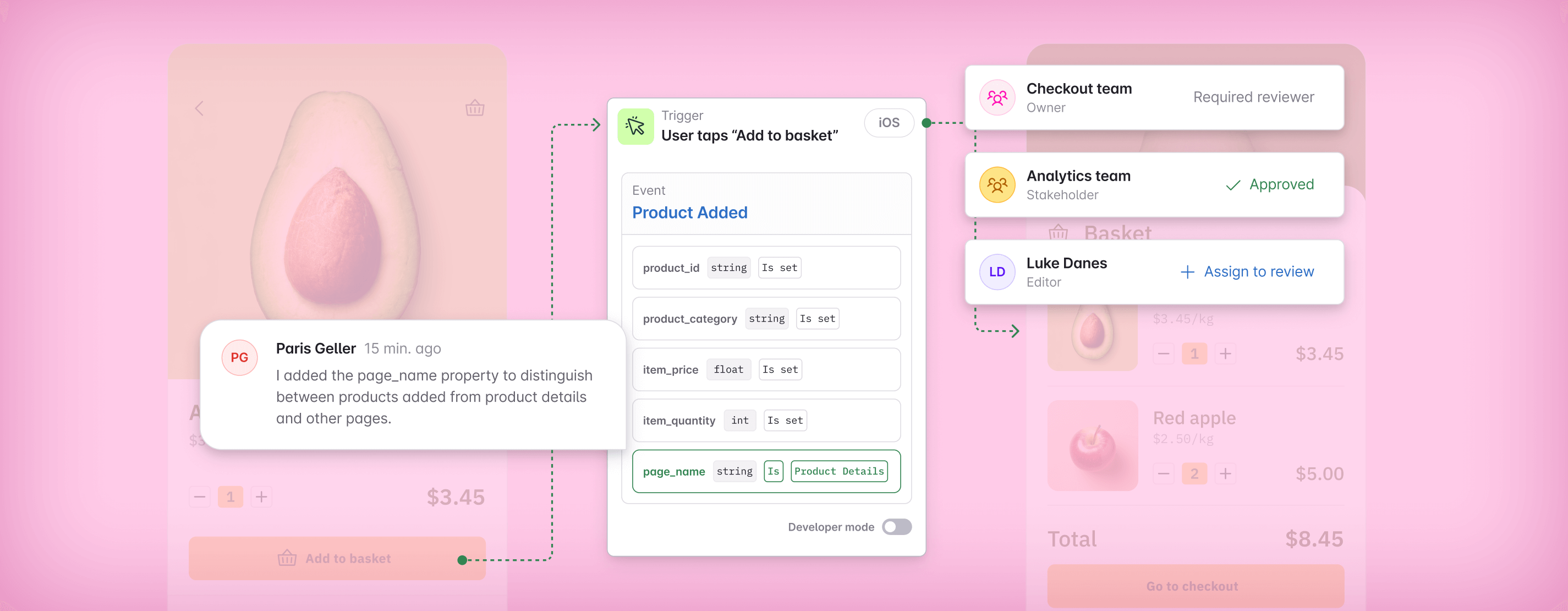In this article

Introducing: Actionable data ownership
From passive documentation to automated, enforced governance.
I’ve previously written about how unclear data ownership slows down product releases and lets mistakes slip through the cracks. Avo’s latest product update is our answer – putting ownership to practice by building clarity and accountability into how work actually gets done.
When we first shipped stakeholder domains last year, our goal was simple: reduce the overwhelm and friction teams experience when scaling their tracking strategy. That foundation unlocked visibility and workflows by providing visibility into who depends on what data, and who should be looped in when definitions change.
But structure alone isn’t enough. We heard loud and clear: ownership needs to be operational. Ownership still lived in Confluence docs, Slack threads, or tribal memory. Review requests bounced around manually.
Over the past weeks, we’ve taken that feedback and built on top of the foundation. The result? A more powerful, end-to-end operating system for data ownership.
Stakeholder teams – now with roles
Through dozens of customer conversations, we learned that the term “domain” was causing confusion. It didn’t align with how most teams think about accountability, or how their orgs are structured. So we’ve rebranded stakeholder domains to stakeholder teams: a clearer, more flexible model for assigning responsibility in your tracking plan.
Stakeholder teams don’t need to mirror your org chart. They’re built around shared responsibility for specific schemas, often centered around an analyst who collaborates across one or more product teams.
All Avo plans (Free, Team, and Enterprise) support stakeholder teams, with up to 5 teams on the Free plan. These teams can be assigned to events, variants, and properties as stakeholders or owners.

To support this structure, we’ve introduced clear roles within stakeholder teams:
- Lead – Manages the team and is ultimately accountable for its events, variants, and properties (often the analyst).
- Members – Collaborators like PMs and engineers who work alongside the lead.
- Approvers – Any lead or member who’s granted the right to approve branches on behalf of the team.
This gives teams the flexibility to structure ownership in a way that reflects how they work in practice – while enabling Avo to enforce the right review flows behind the scenes.
Enforced Ownership for events, variants and properties
Until now, stakeholder teams could be assigned to events and event variants. With this release, they can also be assigned to properties. More importantly they can now be designated as owners of those items.
This isn’t just metadata. Ownership in Avo now powers governance automatically.
Beyond being documented as an owner or stakeholder of items in the tracking plan, each stakeholder team can configure how to be involved when these items are changed. They can opt in to:
- Automatic required reviews – Avo adds them as branch reviewers, and their approval is needed before merge.
- Branch notifications – Avo notifies the team in their connected Slack channel when changes are proposed and keeps them updated as the branch progresses.
- Issue alerts – Avo notifies the team in their connected slack channel for issues that impact them

Here’s a common approach we’ve seen among our design partners :
- Stakeholders are data consumers that rely on a data structure and want visibility into changes. Avo notifies them when a branch impacts items they’re assigned to and when issues impact them.
- Owners are data producers, responsible for the definition and quality of a structure. In addition to sending notifications, Avo requires their approval before a branch can be merged if their owned items are impacted.
A common exception: central data teams. While not directly owning data production or consuming data, they’re responsible for overall data quality and therefore want to review most changes from a governance perspective. They can be assigned as stakeholders across the board and configured to be automatically added as required reviewers when impacted.
An example in practice
Let’s break down how Avo ensures that every team that’s impacted by tracking changes is kept in the loop, every step of the way:
An analyst on the growth team creates a branch to update the tracking plan, including one new event.
Visibility: The analyst sees a list of the Impacted Stakeholder Teams, one impacted owner and two impacted stakeholders.

Notifications and automatic reviews: Once the analyst marks the branch as ready for review, Avo notifies all impacted teams. It then automatically adds the impacted owner and the central data team as required reviewers, since the central team is configured to review any branch where they’re an impacted stakeholder.
Improved reviewer experience: A team member with approval rights reviews and approves the branch on behalf of each required team. When reviewing branches that have undergone multiple rounds of changes, you can filter the changes view to focus only on recent modifications. This prevents reviewers from having to re-review changes they’ve already seen.

Ownership in Inspector and downstream destinations: After the changes have been implemented in the product and the Avo branch has been merged, Avo automatically publishes the updated tracking plan to downstream destinations, including stakeholder and ownership metadata.
Stakeholder teams with Inspector alerts set up will be alerted on any implementation issues, making sure the data collected matches what was defined in Avo.
Ownership in branch audit: To ensure ownership as your tracking plan evolves, an audit check will flag whether new events are missing owners – reinforcing a culture of clear ownership and accountability.
How Ownership Scales with Your Plan
Whether you’re just starting to define responsibility or ready to automate governance across teams, Avo’s ownership model grows with you—making it easy to scale clarity, accountability, and trust.
Free plan: Ownership is visible
Establish clarity around responsibility so your team knows who to involve when issues arise.
- Define up to 5 stakeholder teams to document responsibility
- Assign stakeholder ownership to events, variants, and properties
- View who owns what directly in the tracking plan
- Filter Inspector issues by impacted teams to focus on what matters
- Get Inspector Slack alerts when your team’s data breaks, so nothing slips through the cracks
Team plan: Ownership is actionable
Use stakeholder visibility to avoid blind spots and speed up alignment, without manual guesswork.
- Create unlimited stakeholder teams for full coverage
- See exactly who’s impacted by branch changes, so you can involve the right teams early or adjust to minimize disruption.
- Add stakeholder teams as optional reviewers
- Filter branch changes to only show changes since you last reviewed
- Get Slack notifications when your team is impacted by branch changes and follow the branch progress
- Enable the ownership audit rule to flag gaps before they cause problems
- Protect main branch from premature merges or post-approval changes
Enterprise plan: Ownership is enforced
Enforce quality and accountability at scale with automatic required reviews and enforced audit rules so stakeholders can trust that no changes happen to their data without their knowledge or approval.
- Automatically add impacted stakeholder teams as branch reviewers
- Require approvals from impacted stakeholders before changes go live
- Enforce the ownership audit rule to prevent merges when new events lack owners. This ensures nothing slips through without clear accountability.
From Foundation to Maturity
This update isn’t just a set of features, it’s a step forward in making governance scalable, review workflows automatic, and ownership real.
It builds on the principles we explore in our Data Mesh for Event-Based Data whitepaper: distributing ownership to those with the context to make good decisions without sacrificing quality or control.
Ready to dive in?
As always, tell us what’s working, or where there’s room to grow. We’re building Avo for you.
Block Quote



